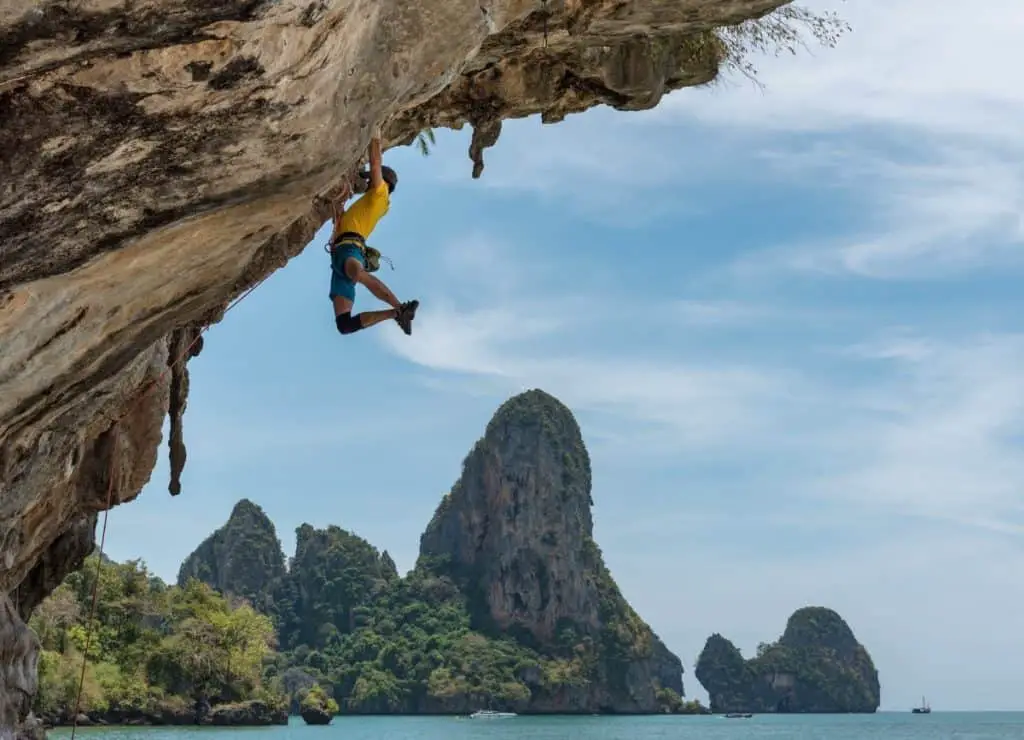
Few things in life feel better than reaching the top – when you’re rock climbing, that is. But, sometimes, even when we’ve reached the top and climbed down, we see other people climbing the same route with much more ease than us. That makes us feel like we’re not as good as we thought, especially when we start to look at how easy the grade was.
Don’t worry though, you might be better than you think. Multiple factors come into play to determine whether you’re good or not. And if you’re not a good climber yet, you could be.
So, how long will it take you to become a good climber? Getting “good” at climbing usually takes about 4 years of indoor climbing, but obviously this depends on a number of factors here, and it also depends on what you class as “good”. The grades V5 in bouldering (V scale), or 5.11 in rock climbing (YDS scale) are classed as better than average. The factors that will help improvement depend on how often you train, age, natural talent, body type, motivation, recovery rate, training regime and more.
Page Jumps
- What is classed as a good climber?
- How long will it take you to become a good climber?
- How can a beginner improve their climbing faster?
- Being Good at Climbing Indoors vs Outdoors
What is classed as a good climber?
Climbing grades are the key to know
There are objective ways to check how good a rock climber is. All you have to do is verify the difficulty grade on the rock climbing circuits that you are doing.
Rock climbing grades are defined by how difficult the task ahead is – and if you can reach the top, you are above that grade.
Using the Yosemite Decimal System, rock climbing grades range from 5.0 to 5.15 and they are divided into four tiers:
- From 5.0 to 5.7 is considered easy – most people start here
- From 5.8 to 5.10 is considered intermediate – people who start to understand how rock climbing works will be here
- From 5.11 to 5.12 is considered hard – this is where most rock climbers are considered good
- From 5.13 to 5.15 is considered elite – few people will manage to get here
Keep in mind these numbers will vary from place to place. They do not mean the same thing for indoor rock climbing and outdoor rock climbing. Someone who is used to 5.10 indoor rock climbing routes might not be able to handle a 5.10 outdoor route – and vice versa.
Using the V scale (aka Hueco Scale), bouldering grades range from V0-V17.
- V0-V2 is classed as easy.
- V3-V4 is class as moderate to intermediate.
- V5-V6 is classed as better than average.
- V7-V8 is classed as hard.
- V9+ is classed as elite.
Don’t let grades define you
Don’t let numbers discourage you from rock climbing. You might be facing a little difficulty from 5.8 routes but that doesn’t mean you are not good! Practice makes perfect – and you will only be able to practice a lot if you are enjoying what you’re doing.
Whether you’re climbing 5.0 or 5.10 routes on the regular, it doesn’t matter. If you’re enjoying yourself and paying attention, you’re bound to become good.
How long will it take you to become a good climber?
There’s no one-fit-all answer
There are a lot of factors that come into play when you want to answer this question. Your height, weight, muscle mass, prior experience, and plenty of other things will determine how long it will take to get good at rock climbing. And even if you take them all into account, they might not be determining factors.
Don’t worry so much about being good, focus on improving!
Your athletic ability will be a determining factor
If you played sports in the past and you’ve just started climbing then you should do better than most other people who have lived a sedentary lifestyle. Especially if it was something that heavily relied on forearm and upper back strength. For example rowers and grapplers have what it takes to get good at rock climbing fast.
As long as you’re progressing, you’re a good climber
Truth is, no matter who you are or what you’ve done in the past, rock climbing is a world of its own. All you have to do is show up and climb as well as you can. There is no way to know how long will it take for you, but there are ways to fast-track your progress. Read down below to find out!
How can a beginner improve their climbing faster?
Hire a coach
There’s no better way to improve other than to hire a good coach. A coach is someone who turns beginner climbers into good rock climbers for a living. They know what mistakes you are going to make – before you make them! Hiring a coach also means getting to know people in your local rock climbing scene.
Climb with more experienced climbers
If you can’t afford a coach, you can go for the next best thing. Ask veteran climbers to climb with you and help you out. Even though they are not obliged to do so, most rock climbers will love to help someone who shares their love and passion for the sport.
Remember not to take it too far, they are not coaches! Climb with them and ask for advice every once and a while, but don’t overdo it!
Climb more
This one’s self-explanatory. If you want to become good at something, do it a lot. But do it right! If you decide to go down this route, listen to your body: if you are feeling pain or discomfort, take a break. Injuries happen – and they might take you out for longer than you wanted to. Simply put, climb more – but do so smartly!
Climb less
Sometimes, by doing more we are progressing less. It’s just the way it is. Progress isn’t linear. You might need to take a break to get your breakthrough. Or perhaps you need to take a break in order to let your muscles heal and get ready for your next session. Either way, sometimes by doing less, we progress more.
Don’t use this as an excuse to train less than you’re supposed to!
Don’t climb at all
If you’re injured or more sore than usual, having some time off might be very beneficial. Taking a week off might solve a lot of your rock climbing issues and advance you in your pursuit of getting better.
Hit the gym
Strengthening your muscles is one simple way to improve by leaps and bounds. Even though rock climbing is an extremely technical sport, strength and muscle resistance are necessary no matter who you are.
Without proper forearm, upper back, and leg strength, you’ll get nowhere. It might be a good idea to train your body to improve your rock climbing skills.
Train with a purpose in mind
If you are wondering why you’re not progressing, it might be because you’re not heading in the right direction. Once you are past the beginner stage in your rock climbing journey, you need to start training with a purpose in mind.
Focus an entire week on improving your footwork. Use another week to improve your grip technique. Get to know your sticking points and fix them. That’s the only way to get better fast.
Stay positive and focus on the long-term
In order to do everything right, you need the right mindset. You won’t be able to progress if you are constantly in a bad mood because you are not good enough. Keep in mind you will be good enough and focus on the long-term.
Don’t waste time thinking why you are not better than the day before, think how good you’ll get in a year.
Being Good at Climbing Indoors vs Outdoors
What’s the difference?
There are a lot of differences between indoor and outdoor climbing. These are the main ones:
- Gear: Indoor climbing requires a good pair of shoes and athletic wear. If you decide to go outside, you are going to need a lot more things to do it right. Check out my recommended gear here.
- Location: Indoor climbing is done in a secure environment inside a gym. Outdoor climbing is done in nature, with all its beauty and dangers.
- Falling: Indoors, the falling aspect of rock climbing is more controlled and safer. Outdoors, while (usually) still safe, is an entirely different animal.
- Footwork: Indoors, you know where to place your feet. There are places where your foot has to go will be marked and waiting for you. Outdoors, not so much. You need to be twice as careful when you are outside.
Climb indoors to improve outdoors – and vice-versa
While indoor rock climbing and outdoor rock climbing are entirely different, this does not mean they are not mutually beneficial. If you are progressing in either one of them, you are also progressing on the other, albeit on a lower level. Sometimes, a breakthrough in one will translate into the other!
Ideally, you should train both of them with a focus on either indoors or outdoors. Either way, they’re both great options, and you’ll probably enjoy both of them.
They are two different things but share one element
Whether you are an indoor rock climber or an outdoor rock climber, you need to train both consistently and smartly! Even if you are not good right now, keep at it and you will, eventually, be so good beginners will come to you for advice!
